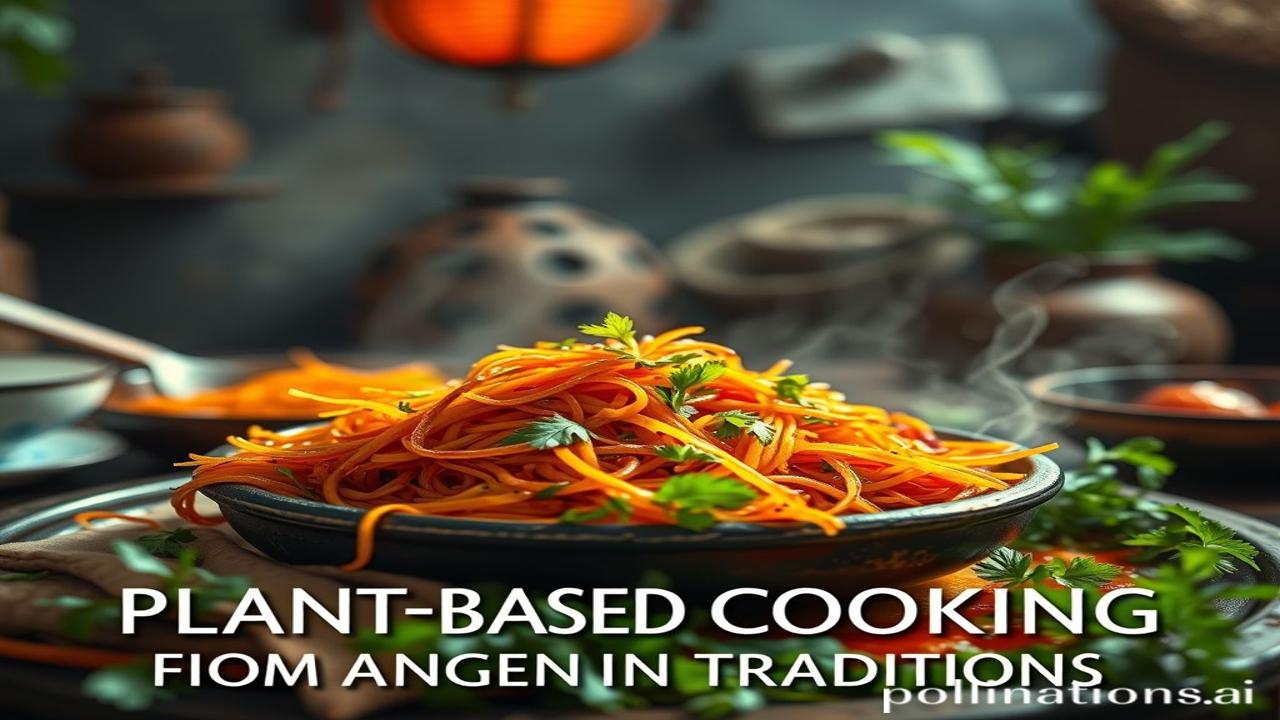Plant-Based Cooking From Ancient Indian Traditions: Ek Khoi Hui Khushboo
Kabhi socha hai, aaj ki chai ki chuski lete waqt, ki iski jadon mein kitni gehrai hai? Kitne rang, kitne swad, kitne itihas isme ghule hue hain? Jaise chai, waise hi Bharat ki plant-based cooking bhi – ek aisa safar jo 5000 saal pehle shuru hua, aur aaj bhi humari thaaliyon mein mahak raha hai. Waqt ki dhool mein kuch kahaniyan chhup jaati hain, lekin yeh toh ek aisi khushboo hai jo har peedhi mein taza rehti hai.
Bharat Ki Rasoi: A Historical Tapestry of Plants
Bharat ki sanskriti mein, bhojan sirf pet bharne ka zariya nahi hai. Yeh toh jeevan ka ek hissa hai, ek anmol den hai, aur Ishwar se jodnewali shakti hai. Ancient India mein, plant-based cooking bohut common thi, especially because of the strong influences of Jainism, Buddhism, and Hinduism, all of which promoted non-violence (Ahimsa) and a respectful relationship with nature.
Kab Aur Kahan? This tradition dates back to the Indus Valley Civilization (3300-1700 BCE). Archaeological evidence reveals the use of various grains like wheat, barley, rice, and millets. Vedic texts (1500-500 BCE) further elaborate on plant-based diets, emphasizing the importance of fruits, vegetables, and legumes.
Kyun Important Hai? Ancient Indians believed that food directly impacted one’s physical, mental, and spiritual well-being. Plant-based food was considered sattvic (pure and harmonious), promoting clarity, calmness, and compassion. It wasn’t just about avoiding meat; it was about cultivating a deeper connection with the earth and living in harmony with all beings.
Zameeni Sach: Jeevan Ki Kahaniyan, Vyaktiyon Ki Jubani
Imagine a day in ancient India.
“Ma Rukmini subah jaldi uthi, ghar ke aangan mein लगे tulsi plant ko pranam kiya. Aaj ghar par sabji aur dal banegi. Pita ji ne khet se ताजा palak aur methi bheja hai,” a young girl says, helping her mother.
The aroma of freshly ground spices fills the air as Rukmini’s mother prepares saag (leafy greens) and dal. She uses traditional earthen pots and wood-fired ovens, adding a smoky depth to the flavours. The meal is simple, nutritious, and deeply satisfying.
In the royal kitchens, the chefs are busy crafting elaborate vegetarian feasts for the king and his court. They use exotic spices imported from far-off lands, creating dishes like khichdi (a rice and lentil dish), bhindi masala (okra cooked with spices), and a variety of mithai (sweets) made with milk, sugar, and nuts.
From humble farmers to powerful rulers, plant-based food played a central role in the lives of people across all social strata.
Dharohar Aur Pehchan: Today’s Echoes
Today, the echoes of ancient Indian plant-based cooking resonate throughout the country. Whether it’s the ubiquitous dal makhani in North India or the tangy sambar of South India, plant-based dishes are a staple of Indian cuisine.
We see its presence in:
- Festivals: Many festivals, like Navratri and Janmashtami, involve fasting on plant-based food.
- Temples: Temples often serve prasadam, which is a plant-based offering to the deities.
- Ayurveda: Ayurvedic principles emphasize the importance of a plant-based diet for maintaining health and well-being.
- Bharatiyata: Embracing plant-based cooking is a way to connect with our cultural heritage and promote a more sustainable and compassionate lifestyle. Modern identity can benefit a lot from the old values.
Mazeedar Tathya: Myth-Buster!
Log samajhte hain ki Indian food mein ghee ka use bohut jyada hota hai, isliye yeh unhealthy hai. Lekin asli sach yeh hai ki ghee, agar moderate quantity mein use kiya jaye toh, bohut beneficial hota hai. It aids digestion, boosts immunity, and provides essential nutrients. The key lies in balance and using high-quality ghee.
Drishya Aur Bhavnayein: Sensory Overload
Imagine walking through a spice market in ancient India. The air is thick with the aroma of cardamom, cloves, cinnamon, and turmeric. The vibrant colours of the spices create a visual feast. The sounds of vendors calling out their wares, the chatter of shoppers, and the clanging of metal pots fill the air. The temple walls feel cool and smooth to the touch, radiating a sense of peace and tranquility.
Antim Vichar Ya Uddharan: The Circle of Life
As we delve into the ancient Indian traditions of plant-based cooking, we realize that it’s not just about the food we eat; it’s about the way we live. It’s about respecting nature, promoting compassion, and connecting with our cultural heritage.
“Annadanam param danam, Vidyadanam atah param;
Annena kshannika tripti, yavajjivam cha vidyaya”
(Food donation is the supreme donation, even superior to knowledge; Food satisfies for a moment, but knowledge lasts a lifetime.)
Let’s embrace this wisdom and create a more sustainable and compassionate future, one plant-based meal at a time.
